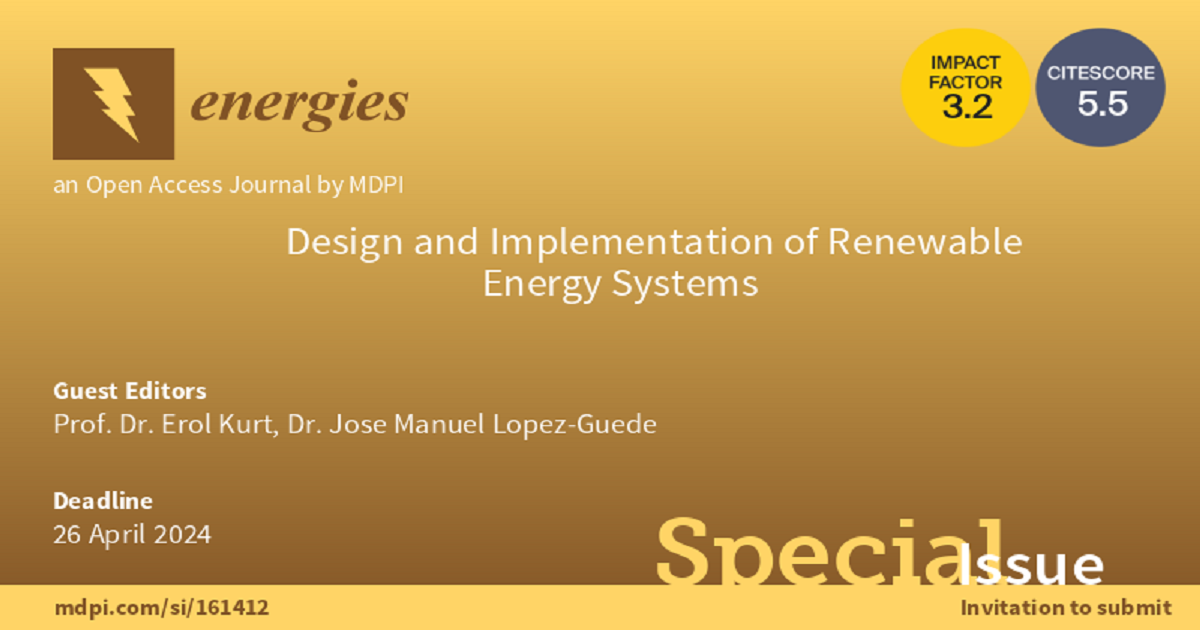- 3.2Impact Factor
- 7.3CiteScore
- 17 daysTime to First Decision
Design and Implementation of Renewable Energy Systems
This special issue belongs to the section “A: Sustainable Energy“.
Special Issue Information
Dear Colleagues,
This issue is devoted to the highly qualified selected papers of the 11th European Conference on Renewable Energy Systems (ECRES2023, ecres.net), which will take place in Riga, Latvia, in a hybrid format. This international event is expected to involve participants from more than 60 countries.
ECRES aims to bring together researchers, engineers and natural scientists from all over the world who are interested in the advancement of all branches of renewable energy systems. Wind, solar, hydrogen, hydro-, geothermal, solar-concentrating, fuel cell, energy harvesting and other energy-related topics are welcome.
We are open to the inclusion of the following related topics:
- Hydrogen energy system design and implementation;
- Policies on renewable energy;
- Energy system optimization;
- Smart systems;
- Energy statistics and efficiency;
- Electric networks;
- Thermodynamical issues on energy;
- Wind energy systems;
- Turbine designs and implementation;
- Photovoltaic material characterization;
- Electrical machine design and implementation;
- Plasma systems for nuclear fusion.
The papers for this Special Issue have already been submitted to the ECRES 2023 conference via the link https://cmt3.research.microsoft.com/ECRES2023 and will be presented in the conference. After approval, successful papers will be directed to the journal.
Prof. Dr. Erol Kurt
Dr. Jose Manuel Lopez-Guede
Guest Editors
Manuscript Submission Information
Manuscripts should be submitted online at www.mdpi.com by registering and logging in to this website. Once you are registered, click here to go to the submission form. Manuscripts can be submitted until the deadline. All submissions that pass pre-check are peer-reviewed. Accepted papers will be published continuously in the journal (as soon as accepted) and will be listed together on the special issue website. Research articles, review articles as well as short communications are invited. For planned papers, a title and short abstract (about 250 words) can be sent to the Editorial Office for assessment.
Submitted manuscripts should not have been published previously, nor be under consideration for publication elsewhere (except conference proceedings papers). All manuscripts are thoroughly refereed through a single-blind peer-review process. A guide for authors and other relevant information for submission of manuscripts is available on the Instructions for Authors page. Energies is an international peer-reviewed open access semimonthly journal published by MDPI.
Please visit the Instructions for Authors page before submitting a manuscript. The Article Processing Charge (APC) for publication in this open access journal is 2600 CHF (Swiss Francs). Submitted papers should be well formatted and use good English. Authors may use MDPI's English editing service prior to publication or during author revisions.
Keywords
- hydrogen
- optimization
- thermodynamics
- wind
- photovoltaics
- electrical machine

Benefits of Publishing in a Special Issue
- Ease of navigation: Grouping papers by topic helps scholars navigate broad scope journals more efficiently.
- Greater discoverability: Special Issues support the reach and impact of scientific research. Articles in Special Issues are more discoverable and cited more frequently.
- Expansion of research network: Special Issues facilitate connections among authors, fostering scientific collaborations.
- External promotion: Articles in Special Issues are often promoted through the journal's social media, increasing their visibility.
- e-Book format: Special Issues with more than 10 articles can be published as dedicated e-books, ensuring wide and rapid dissemination.

